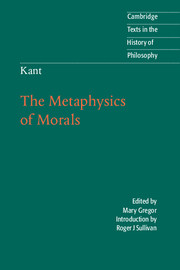Book contents
- Frontmatter
- Contents
- Introduction
- Chronology
- Further reading
- Translator's note on the text
- Part I Metaphysical first principles of the doctrine of right
- Part II Metaphysical first principles of the doctrine of virtue
- I Doctrine of the elements of ethics
- II Doctrine of the methods of ethics
- Index
- Miscellaneous Endmatter
II - Doctrine of the methods of ethics
from Part II - Metaphysical first principles of the doctrine of virtue
- Frontmatter
- Contents
- Introduction
- Chronology
- Further reading
- Translator's note on the text
- Part I Metaphysical first principles of the doctrine of right
- Part II Metaphysical first principles of the doctrine of virtue
- I Doctrine of the elements of ethics
- II Doctrine of the methods of ethics
- Index
- Miscellaneous Endmatter
Summary
Section I
Teaching Ethics
The very concept of virtue already implies that virtue must be acquired (that it is not innate); one need not appeal to anthropological knowledge based on experience to see this. For a human being's moral capacity would not be virtue were it not produced by the strength of his resolution in conflict with powerful opposing inclinations. Virtue is the product of pure practical reason insofar as it gains ascendancy over such inclinations with consciousness of its supremacy (based on freedom).
That virtue can and must be taught already follows from its not being innate; a doctrine of virtues is therefore something that can be taught But since one does not acquire the power to put the rules of virtue into practice merely by being taught how one ought to behave in order to conform with the concept of virtue, the Stoics meant only that virtue cannot be taught merely by concepts of duty or by exhortations (by paraenesis), but must instead be exercised and cultivated by efforts to combat the inner enemy within man (asceticism); for one cannot straightway do all that one wants to do, without having first tried out and exercised one's powers. But the decision to do this must be made all at once and completely, since a disposition (animus) to surrender at times to vice, in order to break away from it gradually, would itself be impure and even vicious, and so could bring about no virtue (which is based on a single principle).
- Type
- Chapter
- Information
- Kant: The Metaphysics of Morals , pp. 219 - 234Publisher: Cambridge University PressPrint publication year: 1996



